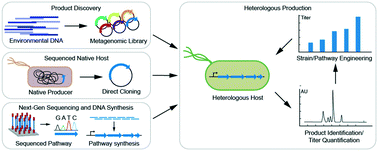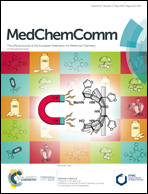Leveraging synthetic biology for producing bioactive polyketides and non-ribosomal peptides in bacterial heterologous hosts†
Abstract
Bacteria have historically been a rich source of natural products (e.g. polyketides and non-ribosomal peptides) that possess medically-relevant activities. Despite extensive discovery programs in both industry and academia, a plethora of biosynthetic pathways remain uncharacterized and the corresponding molecular products untested for potential bioactivities. This knowledge gap comes in part from the fact that many putative natural product producers have not been cultured in conventional laboratory settings in which the corresponding products are produced at detectable levels. Next-generation sequencing technologies are further increasing the knowledge gap by obtaining metagenomic sequence information from complex communities where production of the desired compound cannot be isolated in the laboratory. For these reasons, many groups are turning to synthetic biology to produce putative natural products in heterologous hosts. This strategy depends on the ability to heterologously express putative biosynthetic gene clusters and produce relevant quantities of the corresponding products. Actinobacteria remain the most abundant source of natural products and the most promising heterologous hosts for natural product discovery and production. However, researchers are discovering more natural products from other groups of bacteria, such as myxobacteria and cyanobacteria. Therefore, phylogenetically similar heterologous hosts have become promising candidates for synthesizing these novel molecules. The downside of working with these microbes is the lack of well-characterized genetic tools for optimizing expression of gene clusters and product titers. This review examines heterologous expression of natural product gene clusters in terms of the motivations for this research, the traits desired in an ideal host, tools available to the field, and a survey of recent progress.

- This article is part of the themed collection: Natural Products


 Please wait while we load your content...
Please wait while we load your content...
